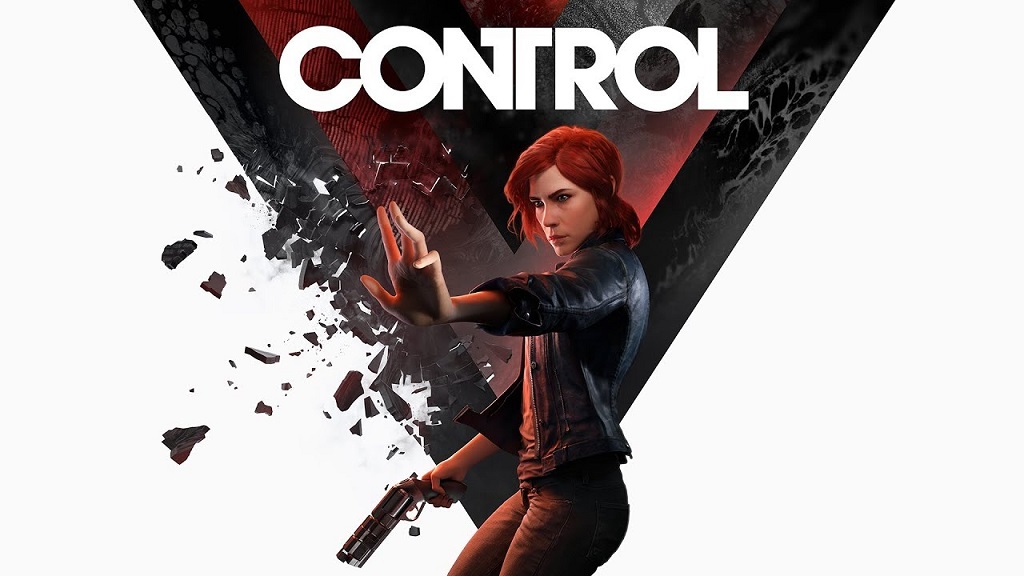
There are often times when I find myself not… really wanting to finish the game I’ve been assigned to review. The professional thing, of course, is to see my way through to completion, even if the longer I push on, the worse the experience gets. So was the case with Control, the newest title from Remedy Games (Alan Wake, Quantum Break) — an action-adventure horror game that might be the blandest experience I’ve had this entire console generation. Obviously, this review is coming weeks after release, and the game’s praises have been sung up and down every corner of the internet, but trying to feign positivity because it’s the norm would frankly be insulting to you guys and unprofessional of me. In fact, by my final hours with it I could accurately say that I hated Control, desperately hoping it would end as I began to barrel through towards the finish line. Of course, I’m getting way ahead of myself here, so let’s back up and try to explain why I disliked this experience so much.
We play as Jessie Faden, a woman who has discovered the mysterious Federal Bureau of Control, or FBC (no not that one), on a quest to find her decades-missing brother. Guided by a supernatural voice at the back of her mind, Jessie plunges into the depths of the organization’s headquarters, The Oldest House — a seemingly self-aware and austiere building that bends reality and rejects modern technology within its walls. However, there’s a catch — a massive containment breach has occurred, and nearly all of the FBC’s “subjects” have escaped. The FBC, you see, studied and contained what are called Objects of Power: seemingly ordinary, everyday objects that have become host to powers mysterious and wills unknowable. From the silly (an infinitely replicating post-it-note) to the insidious (a fridge that goes berserk when eye contact with it is broken), these objects are the reason behind the FBC’s creation. The cause of the containment breach is something else, altogether though. It’s a corrupting influence Jessie nicknames The Hiss that alters the researchers and staff of the Oldest House into puppeteered zombie-like killers. This all sounds like a tremendous template for a tense, MIB-esque adventure, right? Well, as long as you have no idea what the SCP Foundation is.
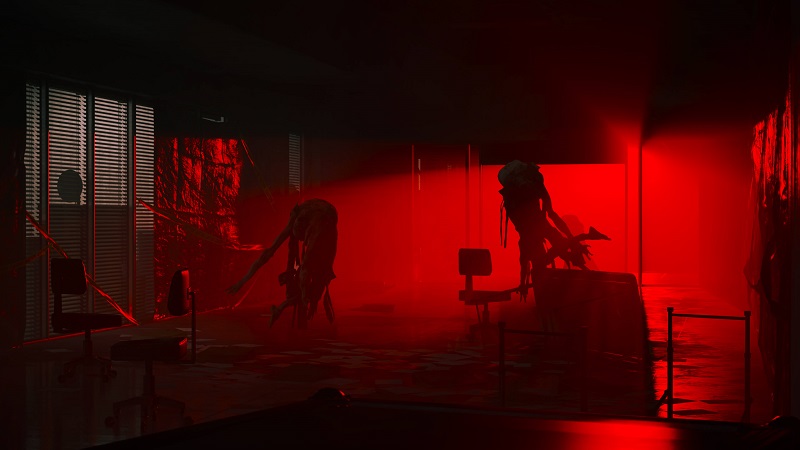
The beginnings of my misgivings was foreknowledge of the SCP Foundation, a loose collection of internet spooky stories told in the structure of categorized events, objects, and beings held within a secure research facility. SCPs are nearly as ubiquitous with internet campfire horror as Creepy Pasta are, and one can easily lose themselves to its lore for hours. From the silly (a haunted post-it-note that shouts at you) to the insidious (a statue that goes berserk when eye contact with it is broken), they’re essential reading to horror fans. There have been several games recreating these files, from SCP: Containment Breach to SCP-087B, you can get interactive SCP goodness pretty easily. So I’m left to ask why, oh why, is Remedy so shamelessly ripping it off. My first guess would be that in a similar fashion to Alan Wake, Control is mostly boiled down to a list of things the developers liked. While Alan Wake (I know it’s beloved, but hear me out) was essentially just Twin Peaks, Resident Evil 4, ObsCure, and the collective works of Stephen King mashed together — Control ends up being much the same. Operating as a combination of SCP Foundation mythos, Men in Black, Dead Space, some degree of ’50s era government sci-fi (think XCOM: The Bureau Declassified, or hell just Men in Black 3), and the collective works of David Lynch, it feels like seeing the rings in a tree rather than meer inspirations. I found myself increasingly frustrated as so few original ideas permeated the experience, often sourcing concepts to one thing or the other. You could argue that they’re giving these ideas a “AAA” experience that couldn’t be found elsewhere, but… recreating someone else’s idea with a more expensive coat of paint doesn’t make the imitation any more sincere.
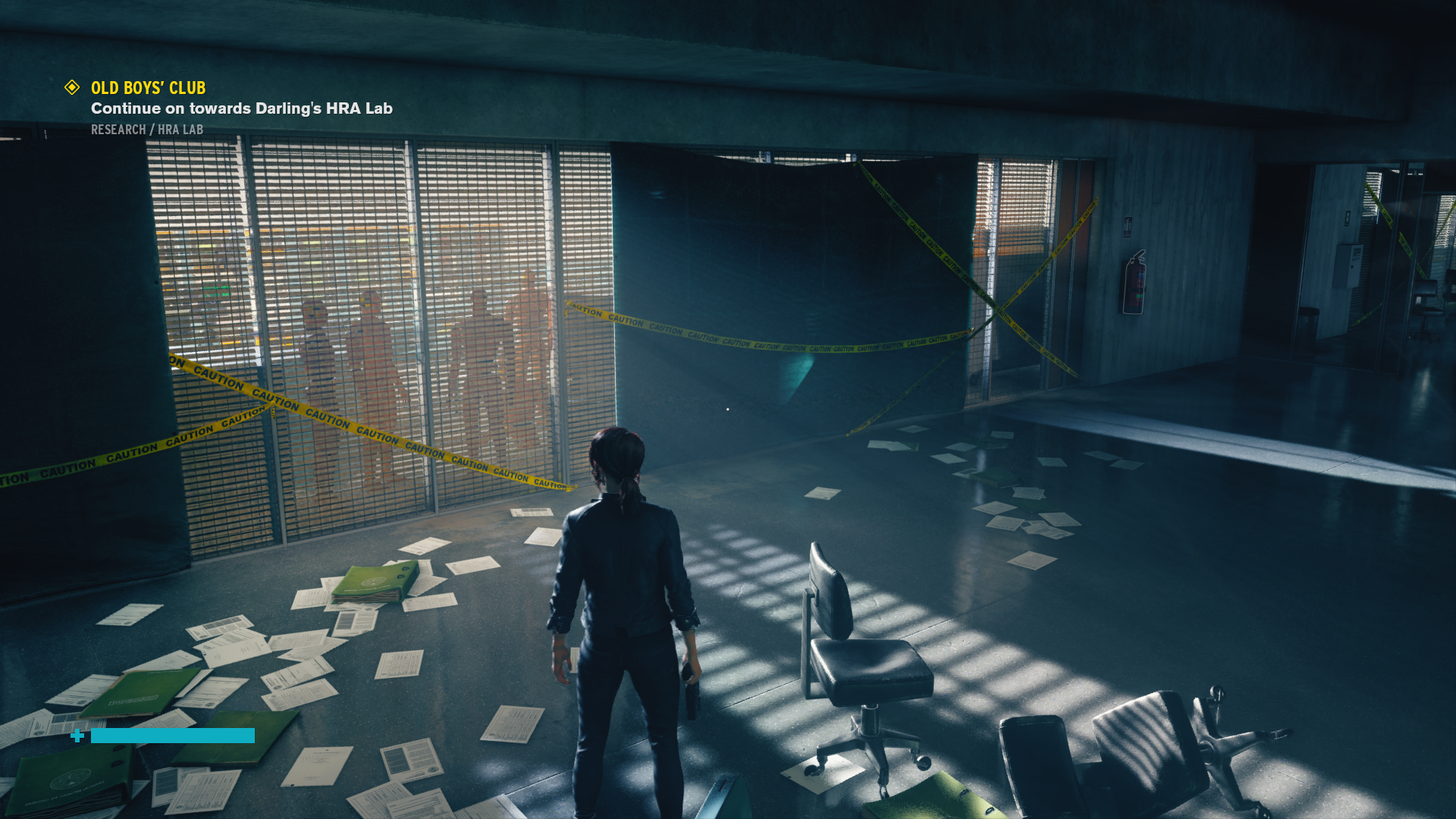
Of course, that’s only really discussing the story, the next piece of the puzzle is the combat. Fluid and easy to pick up, the strongest aspect of Control may indeed be its combat, combining easy to master gunplay and a suite of superpowers Jessie can unlock. The presentation is simply incredible, and the sound design on the guns (well, gun, it changes forms into different kinds) is wonderfully deep and powerful. The powers range from being able to lift up objects (and if none are available the floor) in the room to hurl at enemies, and eventually gaining the ability to fly. There are others too, of course. You can rip up the floor to make a temporary shield for yourself, and “hack” into enemies to turn them to your side for a few seconds.
The number of mechanics are robust and offer many different ways to tackle a situation, which is a shame since the combat in Control is also incredibly boring. Control does not have a difficulty selection, and as such, I found it mind-numbingly easy. After nearly 20 hours of play, I found that I only ever died to boss encounters and when stepping off a ledge into the void by accident. Every enemy drops health upon death, and you can upgrade how much health they drop as well, leading to fights where you kinda have to want to make your own challenge. Modifiers and upgrades for both yourself and your different weapon forms can be found, each one making combat even easier — eventually, I just stopped bothering. Outside of upgrading a new ability for my superpowers, I stopped upgrading or modifying my weapons only 8 hours in and never experienced any increase in difficulty.
The lack of requiring ammo of any kind only ads to this ease, as every form of the gun recharges its ammo (as do your powers). Simply swapping back and forth between your gun and the “throw stuff” ability when the other is on cooldown results in never really having to back off, and combat encounters are often over in seconds. The closest combat ever gets to actual difficulty is that the haze of red smoke enemies create upon death often completely obscures the screen, but it’s at worst something you just have to step around.
Much of the powers I never even really ended up needing — there’s no point in the shield ability (again, just killing an enemy rewards you with instant health), and the mind hack I genuinely forgot about until I went through some menus to double-check I was getting everything right for this review. This all ends up rounding out to very, very dull encounters that, as I found no reason to upgrade further, became very pointless encounters that simply slowed my progress… until I also figured out that you really don’t have to engage at all. Yes, there are encounters where you must clear out a room in order to unlock one of the control points (used to upgrade and quick travel around the Oldest House), but others on your way to and from story objectives can often be completely ignored. The enemies rarely expand beyond a pool of red glowing dudes, so you aren’t missing out really. Aside from some “mold zombies” (oh no) the variety is painfully lacking, and never really offers up much to really force you to improvise with the massive suite of weapons and powers at your disposal. I stopped switching to my shotgun-type gun after a while, popping off pistol shots from across the room when necessary was so much easier. This is what’s called Dominant Strategy in game design, and this game is riddled with it.
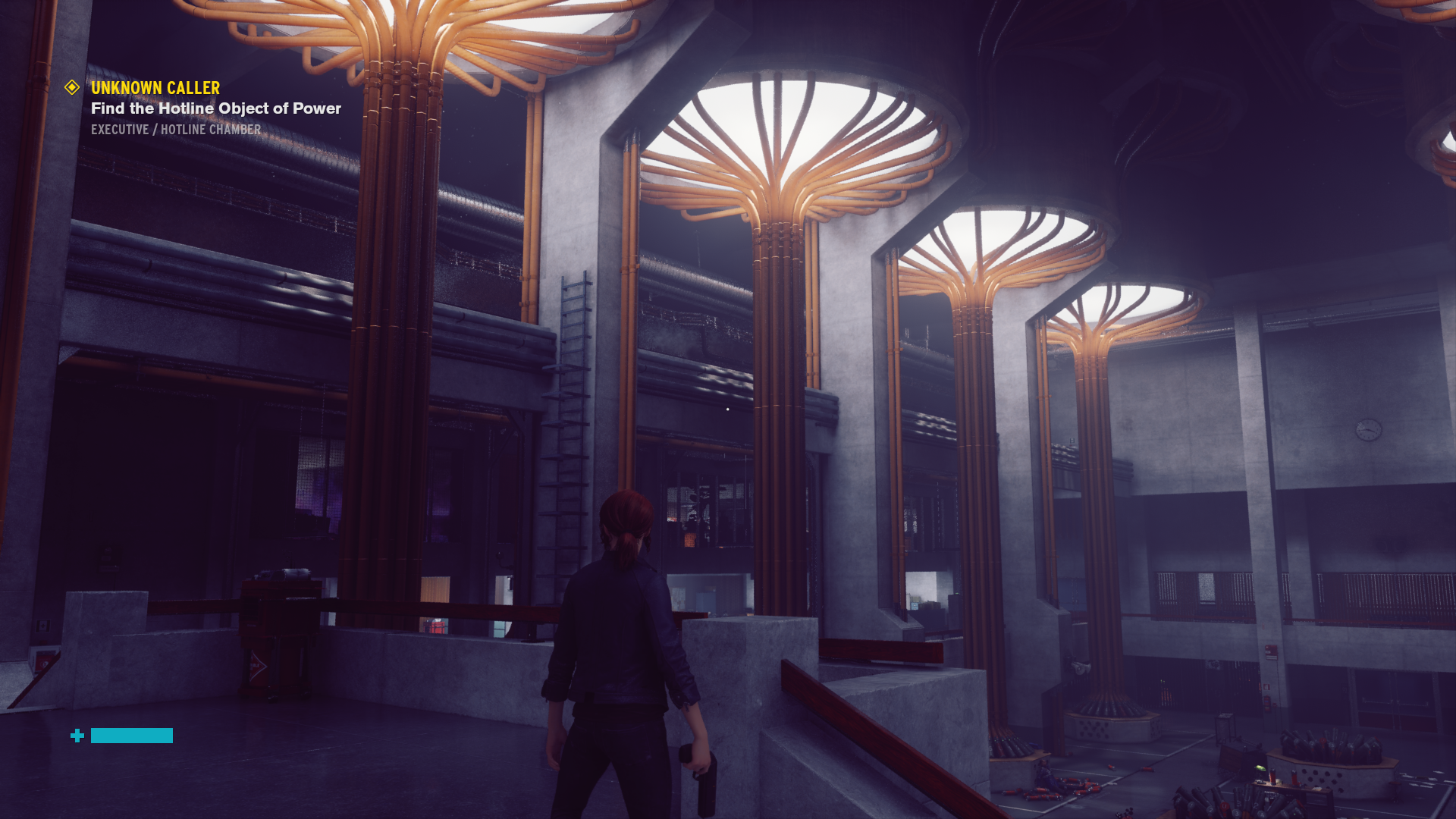
All of this, of course, ends up looping me back around to the game’s story, which is so much less clever and deep than it thinks it is. Told through a combination of blank-eyed robot feeling encounters with a cast of obviously scanned real-world actors does little to put a pep in my step towards completion, not to mention the frankly obnoxious show-off nature of the direction. When we hear either Jessie’s inner monologue, or when she converses with the mysterious voice I mentioned, the camera zooms in for an extreme close up of her eyes. This happens constantly, and aside from the “wow, this is a really nice character model and a very impressive engine” it makes the already Mass Effect 1 era feeling conversations feel even more detached as Jessie (and the developers) make it clear that she honestly doesn’t give much of a shit about them or what’s going on. In general, Jessie feels weirdly detached from the goings-on within the Oldest House, barely reacting to any of the horrors or weirdness around her, which is bizarre considering she never shuts up.
Constantly rambling to herself about her thoughts and hopes in finding her brother, her opinions on the FBC staff, her plans for solving some problem or other, and yet she never seems to stop to really give anything a second thought. Portraits of the Director around the FBC suddenly change to portraits of her? No reaction at all, but maybe we’re supposed to infer that she honestly didn’t notice (I mean, they’re huge, and I’m face-to-face with them, but sure). Finding a document with the FBC logo, muttering about how she knows that she’s seen it before… but WHERE (couldn’t possibly have been the giant one on the wall that’s literally the first thing you see when you boot up the game, or the other five or six you see before finding this document). But when we gain the ability of flight? She literally never acknowledges it. Not even a cute “woah that’s wooaahhhh” Greatest American Hero moment before moving on. She acts like it’s business as usual. It’s fucking FLIGHT, Jessie.
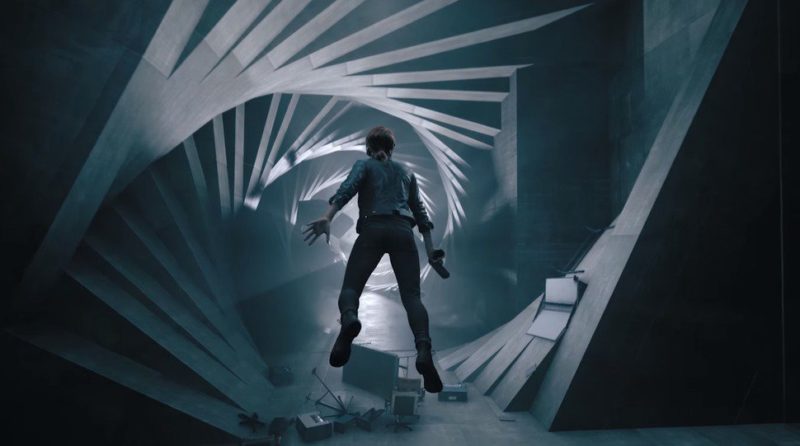
This lack of humanity keeps Jessie at such an emotional distance I was never able to really believe her as anything more than a video game person. This, of course, goes without mentioning Remedy’s equally obnoxious and distracting fetish for live-action footage, going back practically to the studio’s inception. I’m sure there are plenty of people who think it’s cool looking, but the live-action footage only helps untangle me from whatever immersion the otherwise very-nearly photo-realistic visuals had accomplished. Putting a video game person next to a real person only results in making the video game person look even more like a video game person. It’s literally the only thing that does. Stop it.
So combat is monotonous, the story is a muddled patchwork of copy-pasted ideas and a robotic, inhuman character. Did I find anything really worth getting out of Control? Depends on what you’re here for. Again, the visuals are simply incredible, the Northlight Engine is easily the most photo-realistic any video game is getting right now. I also loved the presentation, like the Captain America: Civil War GIANT WORDS ON THE SCREEN thing it does when entering a new area. While I’m not a fan of the austere grey cement block simplicity of the Oldest House, the game does occasionally break it up with some more fun art deco and Twin Peaks-styled fare. The performances are generally good, even if there isn’t a whole lot to work with, and there’s some really cool stuff going on in the side missions. While the main story is a boring drip-feed of “go here, do that” monotony, the side-quests can actually be a lot more fun and rewarding. I used the Fridge Object as an example of SCP infringement earlier because the resulting boss fight from that side quest is actually pretty awesome. It’s a dull, plodding boss fight mechanically (the only thing that will ever kill you is that the floor breaks away and you’ll end up stepping off into the void because your focus is on the monster), but the creature itself is super cool looking. Another involving a mirror is super fun and creative, and I wish that more of that was present in the main storyline rather than the dull zombies and sifting through endless paperwork.
Oh, if you like documents in games, you’re in for a treat. There are hundreds, everywhere. You can find one in almost every room, enemies give you more upon killing them, and some cutscenes become viewable documents, forcing you to sift through to get rid of the little unread marker. Even worse, 90% of them contain almost no information or are just straight-up jokes. One or two is fine. Dozens though? Come on, man.
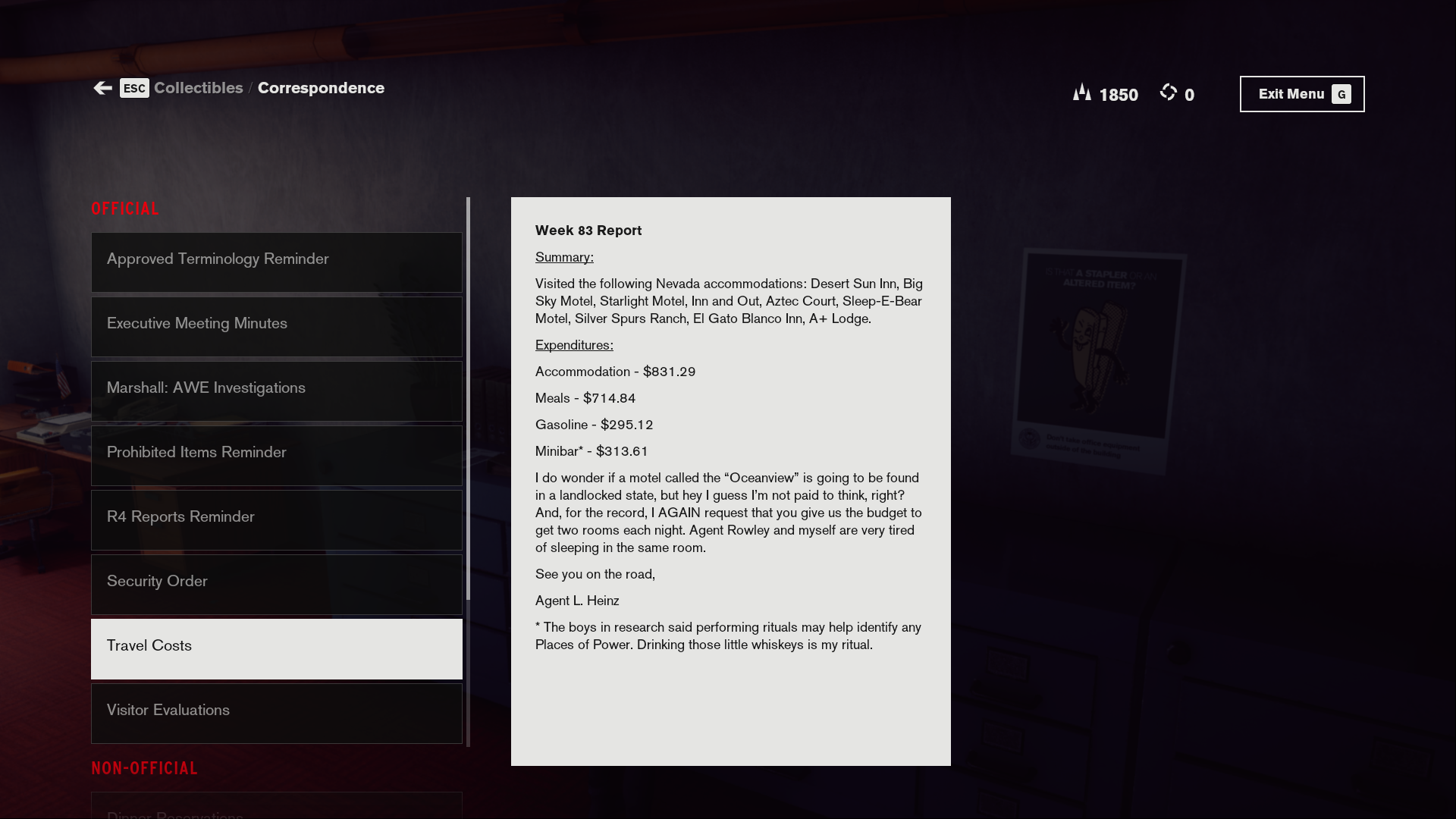
Suffice it to say, I hated Control. It’s amazingly well presented, a tremendous amount of work went into it, and I’m sure fans are delighted to see that it may indeed have strong connections to the beloved Alan Wake series. Despite that, it was one of the most boring, styrofoam feeling experiences I’ve had all year. I wish I could’ve liked this, I really do, but having a lot of money and a lot of polish doesn’t save this experience from being trite and unremarkable. I expected more from this and was disappointed at almost every turn. There’s better, inspired versions of nearly every idea here, and you’ve probably already seen or played them.
 (4 / 10)
(4 / 10)
Below Average
 (4 / 10)
(4 / 10)
 sisslethecat
sisslethecat


